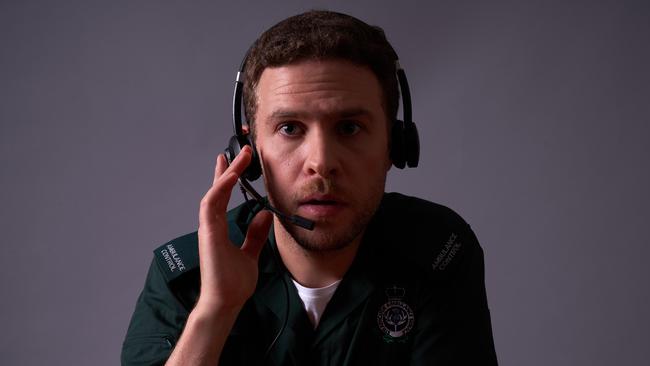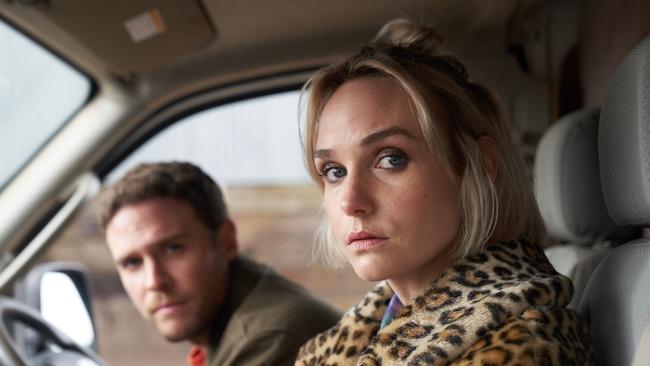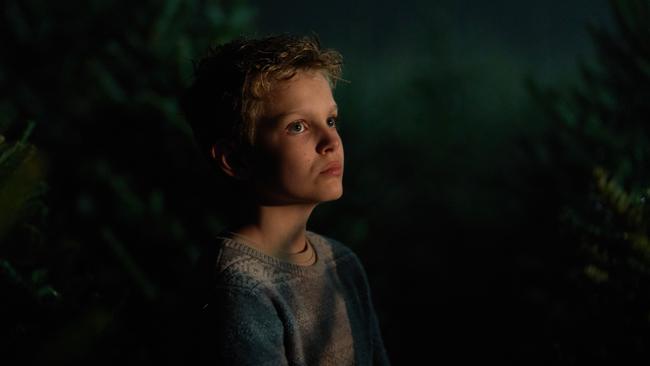Frantic call from the past in BBC series The Control Room
A young worker in a call centre receives a cry for help that is all too close to home in new BBC drama The Control Room.

The Control Room is the latest BBC drama to arrive on Foxtel and it’s relentless and compelling. It is another of those hybridised shows from the UK and is part mystery thriller, part twisted love story and part coming-of-age narrative. The series is created and written by Nick Leather, best known for Murdered for Being Different, the story of the 2007 murder of Sophie Lancaster in a park in Bacup, Lancashire; and Mother’s Day, his masterly account of the aftermath of the 1993 IRA bombing attack in Warrington, which claimed the lives of two boys and left more than 50 people injured.
It’s from Hartswood Films, which was founded by the legendary Beryl Vertue. The company is these days in partnership with creative director Steven Moffat and has produced among many other shows Jekyll in 2007, starring James Nesbitt as Robert Louis Stevenson’s doctor with a split personality. Hartswood also produced the hugely popular Sherlock, that wonderfully campy, irreverent take on Arthur Conan Doyle’s detective. That series, co-created by Moffat and Mark Gatiss, saw Benedict Cumberbatch as Holmes and Martin Freeman as Dr Watson.
The Control Room is directed by the talented Amy Neil, who directed episodes of the pulpy espionage thriller Hanna and also the twisty Trust Me, a hospital thriller about an imposter doctor doing the wrong thing for all the right reasons.
It’s one of those thrillers where a character is caught at moments that in time define them: a decision to pick up the phone, to ignore a cry for help, the refusal to sing the national anthem, a moment of sexual jealousy, a seemingly insignificant car accident, a thought that suddenly consumes. A life is changed by a freakish or serendipitous occurrence, then an emerging mystery is built around the moral dilemmas that emerge as consequences of mistakes, unwise choices and personal weakness.
And Leather’s drama highlights just how easily lives turn on quirks of fate, that the universe has an order and that no matter how hard you try, you can’t get away from it.
It’s also one of those psychological mysteries that lures you almost instantly into a state of anticipatory anxiety, threat and guilt. You’re never quite comfortably sure what you feel for the central antagonist, Gabe, played with a nice nervy intensity by Iain De Caestecker, even as you sympathise with him and the situation he creates for himself. He’s a character we quickly discover carries with him the events that have shaped his life and is unable to free himself of their emotional weight.

Gabe is a young call handler in the control room at Glasgow’s Strathclyde Ambulance Service; he is newish to the job but empathetic, compassionate and good at it. He takes essential details about the condition of patients who make urgent contact, tagging their location, logging the information on to a computer system.
In extreme cases, he may have to talk a member of the public through an emergency procedure, such as clearing an obstruction from someone’s airway. Or he might need to persuade someone they should visit their GP or emergency department rather than sending an emergency vehicle to them. The information is then passed to an emergency medical dispatcher who uses a triage system to decide which staff and vehicles to dispatch, based on the severity of the situation and the resources available.
Leather says the concept for the series came to him when his daughter woke up ill one morning. “We called 999 and in that desperate few minutes, I realised sort of how profoundly the person on the other end of the line can help you and affect you,” he says.
“Their manner is so important and it’s quite an intense relationship for a few minutes. Everything was okay in the end but then the next time I sat down and tried to come up with a story, I wrote two things at the top; one was call room handler and caller. I then put a circle around it and tried to think of the way the relationship between those two people would be and a scene that involved them both.”
When we meet Gabe in the control room he’s a bit shy, but he’s been there about a year and is good at what he has to do, every few minutes, dealing competently with matters of life and death. His sign off tag is always the slightly odd, as it turns out, “I’ll hold a good thought for you.”
Leather quickly establishes two other central characters in the opening moments: Gabe’s colleague Anthony (Daniel Portman) and his new workplace romance Leigh (Taj Atwal), though he’s a bit offhand with her and it’s obviously early days in the relationship.
Then suddenly Gabe is coping with a new call from someone who is having a baby in a car somewhere after breaking down on the way to hospital. Then another emergency strikes the Control Room. Gabe takes a call from a woman weeping as a man apparently lies somewhere dying, bleeding badly. She won’t tell him her name. The man dies. And again he says, “I’ll hold a good thought for you.”
This seems to trigger some recognition from the anonymous woman. “Do I know you?” she says. Suddenly as he takes this call he realises that the life on the line is actually his own.
She seems to know him as “Gabo”, a forgotten childhood nickname. Flustered, he denies all knowledge of her to his colleagues and leaves the building distraught as memories of the woman who turns out to be Samantha Tolmie Balfron (Joanna Vanderham), revealed in flashbacks, overwhelm him, denying all knowledge of possible suspects after she admits she killed the man, after “two years of hell”.
He takes off, running from the Centre. He flees back to his past and eventually meets up with Samantha in a burnt-out cabin in the woods, an old Christmas tree farm that obviously holds the secrets to their past. Flashbacks give us something of their story, which is beautifully played between the young Gabe (Harvey Calderwood) and Sam (Farrah Thomas). What caused the fire that seems to have such meaning for them? Why does Gabe tell her in the past, “I’ll always sort it out for you”?

The meeting sees him becoming her accomplice and all hell is unleashed as he’s determined to help her, no matter the cost to him. The pace picks up and somehow our reluctant anti-hero becomes something of an action figure and is persuasive with it, too.
A good plot needs to be more than one that makes for good scenes; the parts are never greater than the whole. Plot is a vehicle for meaning and the ending of an episode, like that of a detective novel, should set up vibrations which run backwards through the entire structure.
And this is certainly the case here. There is a cliffhanger finish at the end of the first episode that gives us little idea of where this story will head — except that blackmail is possibly involved. The viewer also anticipates a more thorough investigation of just what Gabe has been up to through his long night of clandestine activities and a closer look at his relationship with the slippery mystery woman Sam.
It’s well-directed by Neil who, with the skill of her experienced director of photography James Aspinall (The Durrells, Poldark), makes great play with the noirishness of the city: Gabe alone in his nondescript flat, crisscrossed by shadows as the telephone insistently rings after he runs from his workplace. When he’s outside in the dark streets, Glasgow seems implacable and unassailable, Gabe frail and vulnerable, always on the run.
This encroaching world of plot twists and stratagems is nicely contrasted to the liberating lush world of the sweeping highland glens in which most of the flashbacks take place and the fateful meeting after all those years of the older Gabe and Sam. There’s a fine soundtrack too from Canadian composer Carly Paradis, also responsible for the Line of Duty music. It not only drives the narrative momentum but adds a brooding emotional texture to the story. (TV music, she says, is like a secret character.)
It’s a classy piece of British drama and Leather is good at allowing his characters to expose their betrayals, uncertainties and self-mistrust with sincerity, if painfully at times.
The Control Room, streaming on Foxtel.




To join the conversation, please log in. Don't have an account? Register
Join the conversation, you are commenting as Logout